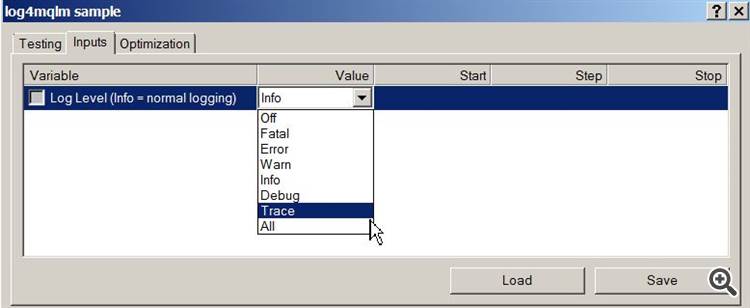Watch how to download trading robots for free
Find us on Facebook!
Join our fan page
Join our fan page
You liked the script? Try it in the MetaTrader 5 terminal
- Views:
- 6041
- Rating:
- Published:
- Updated:
-
Need a robot or indicator based on this code? Order it on Freelance Go to Freelance
Log4mql(mini) - light header-only version of Log4mql that provides standardized logging.
Installation/Usage
- Add log4mqlm.mqh to your Include folder.
- View the sample code to get an overview of the usage.
Inputs
Log4mql(mini) requires only one input field. There is no logging to files.
- Loglevel, supports Trace, Debug, Info, Warn, Error and Fatal
Message Pattern
The message pattern will have a fixed format which corresponds to its appropriate severity level, according to below table.
| Severity | Format | Sample output |
|---|---|---|
| Info (the commonly used default) | %func: %msg | OnInit: Log level: TRACE |
| Debug, Trace | %func(%file:%line): %msg | OnInit(log4mqlm_sample.mq4:72): initializing |
| Warn | WARN %func(%file:%line): %msg | WARN SomeFunction(log4mqlm_sample.mq4:64): stoploss too tight |
| Error | ERROR %func(%file:%line): %msg optionally followed by: [, error %lasterr - %lasterrdesc] | ERROR OnDeinit(log4mqlm_sample.mq4:85): open 'some file' failed, error 5004 - Cannot open file |
| Fatal | FATAL ... as above | FATAL ... |
Functions
Log4mql(mini) provides functions and preprocessor macros for logging, all macros are to be used like functions.
| Return type | Function name | Description |
|---|---|---|
| bool | PRINT (...) | Prints its message if log level is set at least to INFO (= normal logging behavior). Supports up to 9 arguments - PRINT("1",2,etc) - if you need more, expand the templates. Returns true if message was logged, else false. |
| bool | PRINTF (string format,...) | Like PRINT but prints a formatted message. Same rules as known from PrintFormat apply. |
| bool | WARN (...) WARNF (string format,...) | Prints its message if log level is set at least to WARN. |
| bool | ERROR (...) ERRORF (string format,...) | Prints its message if log level is at least ERROR. Adds _LastError description if set. |
| bool | FATAL (...) FATALF (string format,...) | Like ERROR, but with termination. You should call ExpertRemove() or exit immediately otherwise after this. Example: if(step<MinStep) { FATALF("invalid step size: %f",step); ExpertRemove(); return; } |
| bool | DEBUG (...) DEBUGF (string format,...) | Messages for DEBUG level. |
| bool | TRACE (...) TRACEF (string format,...) | Messages for TRACE (more verbose than DEBUG, for function entries, calculations etc). |
| string | L4mq.LastMessage() | Get the last message that has been logged. |
| int | L4mq.LastLevel() | Get the severity level of the last logging event. |
| int | L4mq.Level() | Get the severity level of the logger. |
| string | L4mq.LevelAsString() | Get the severity level of the logger as string. |
| void | L4mq.SetLevel(int) | Set the severity level for the logger. |
| ulong | L4mq.SeqNr() | Get the sequence number of the last logged event. |
| bool | L4mq.logged | true if the last event was logged. |
| string | Log4mql::GetErrorDescription(int err) | Get the description of an error code like _LastError. |
| string | Log4mql::GetUninitReason(int reason) | Get the description of the uninit reason. |
| string | Log4mql::LoglevelToString(int level) | Convert a log level to a descriptive string. |
Notes
- As the functionality strives to be as simple as possible, there is no logging to files. You could implement some on your own if you want.
- You are free to use this code in your work, however, if you share the source code you must not remove the copyright and license notice.
- The full functionality of Log4mql is available here: https://www.mql5.com/en/code/31425 (MT4) or here: https://www.mql5.com/en/code/31452 (MT5)
 Corrected moving averages
Corrected moving averages
Corrected moving averages
 The intersections of two lines
The intersections of two lines
In MetaTrader 4, we intend to calculate the intersection coordinates of two straight line objects with different slopes using MQL4.
 The colored volumes (English Version)
The colored volumes (English Version)
Colored volumes at the bottom of the chart
 Breakout Strength Meter - MT4
Breakout Strength Meter - MT4
The breakout strength meter is a trading tool that is used to identify which currencies are the strongest to breakout, and which currencies are the weakest to breakout


